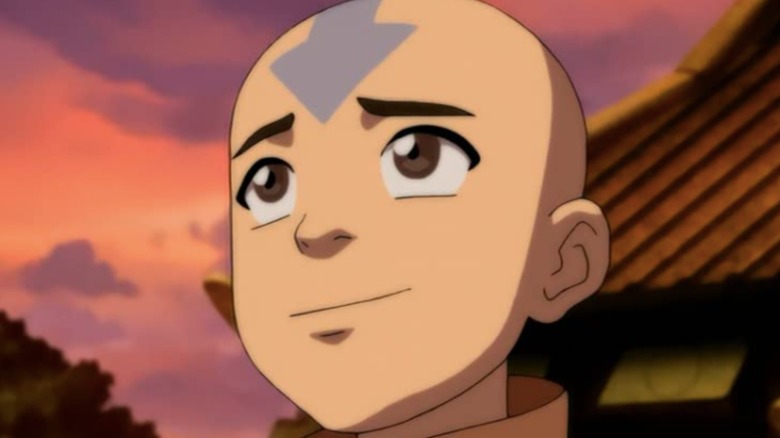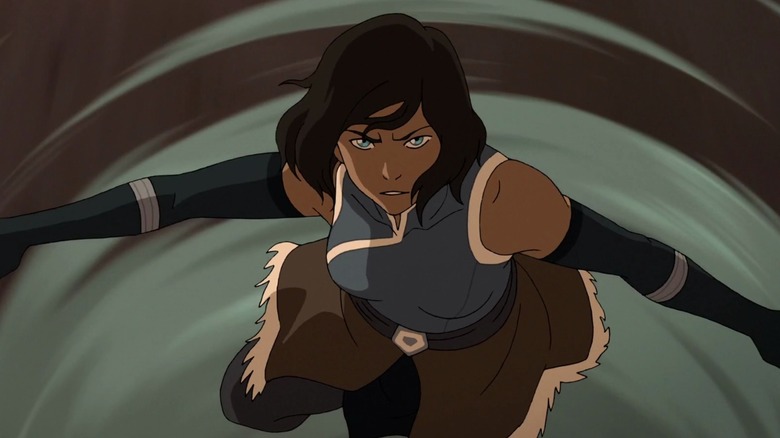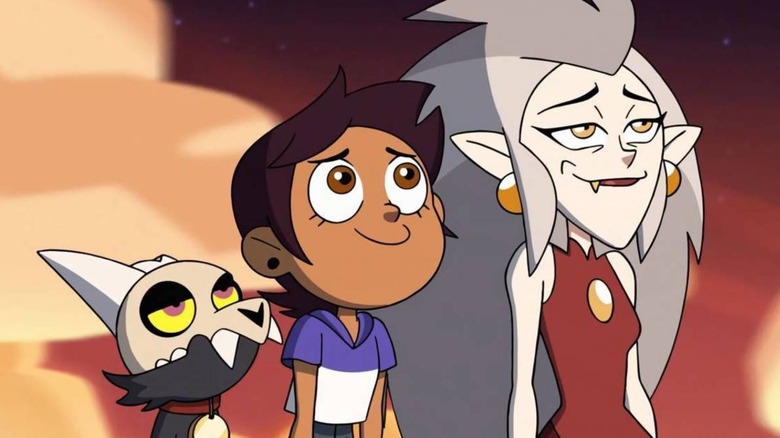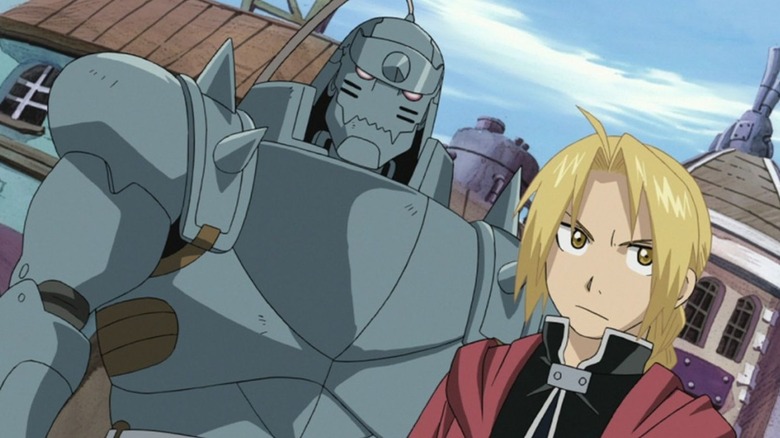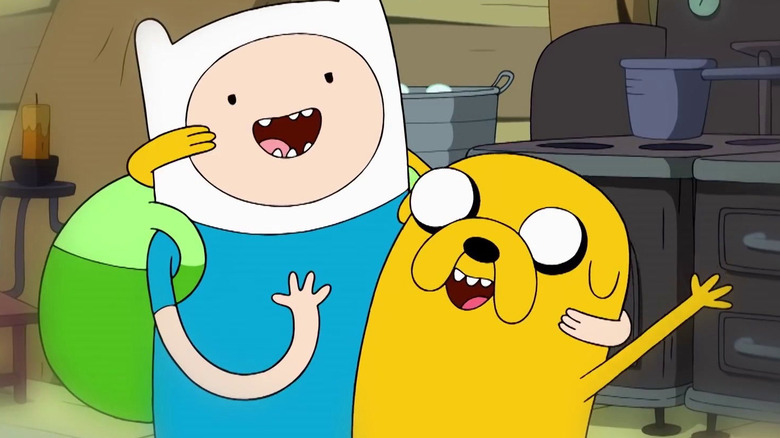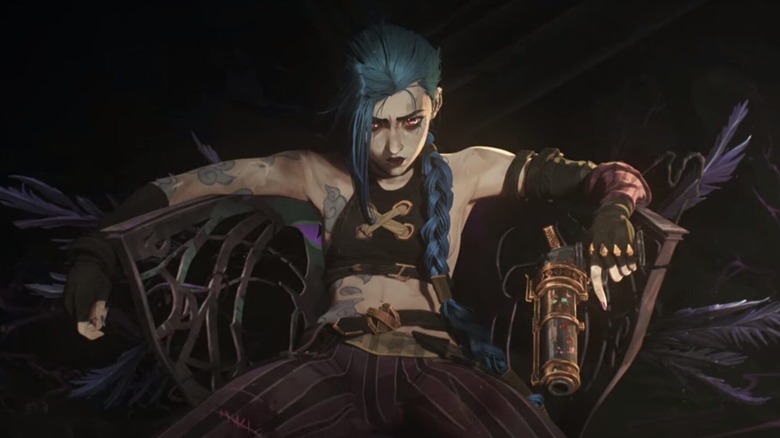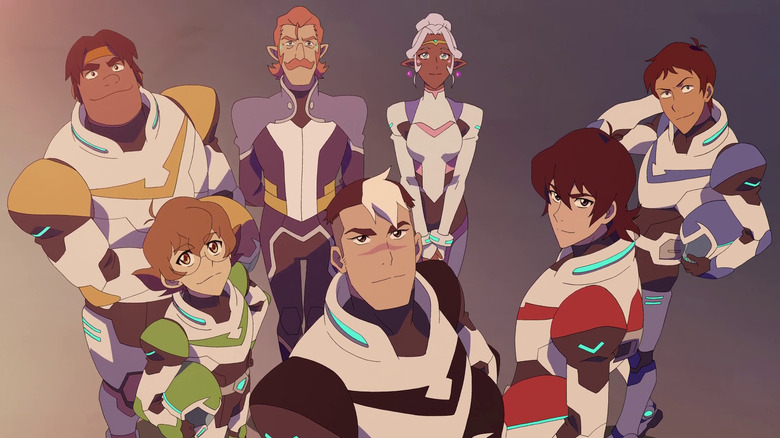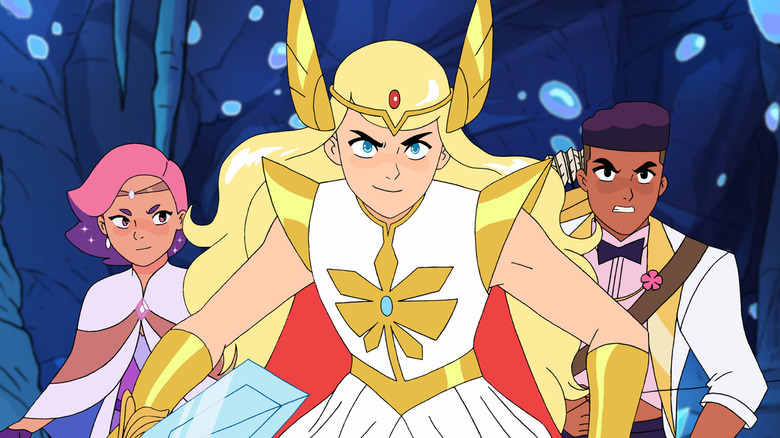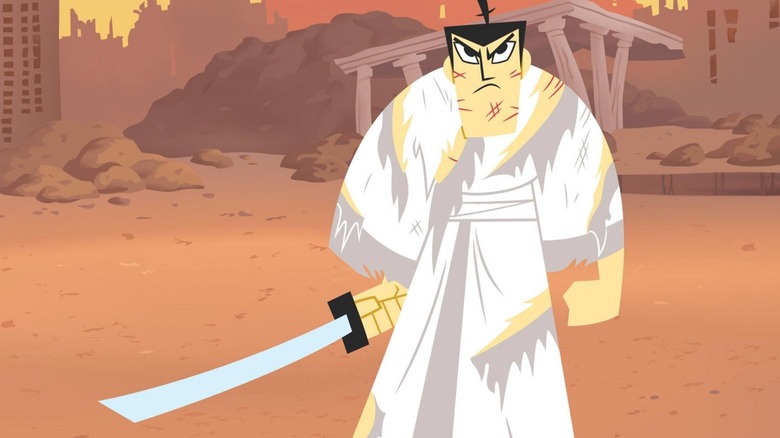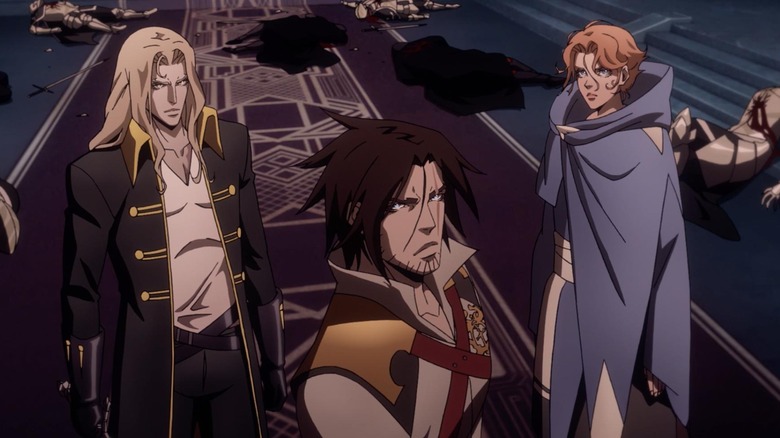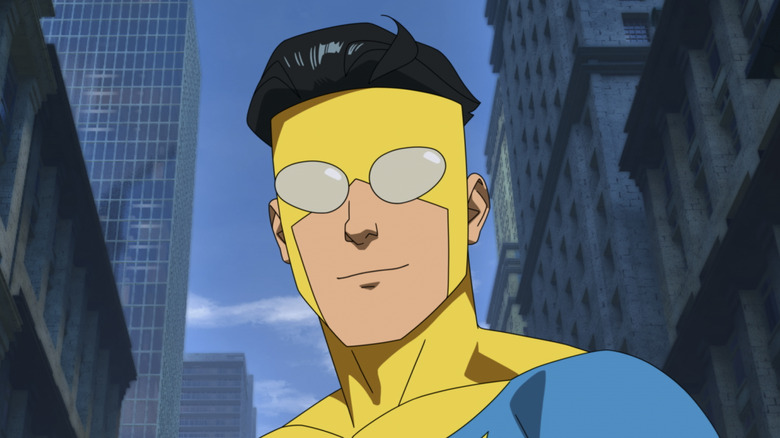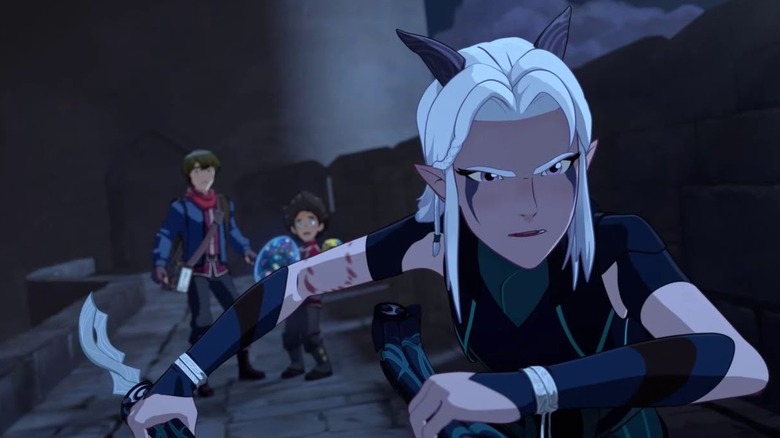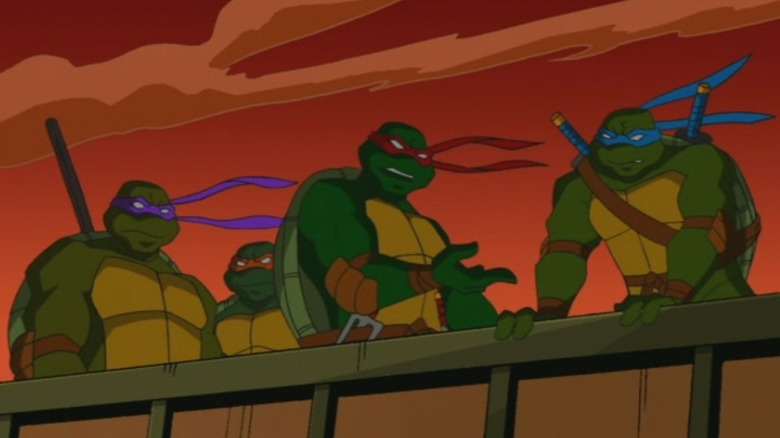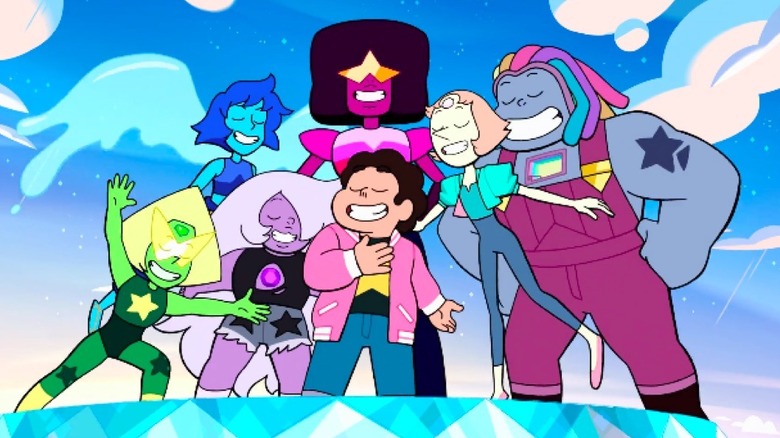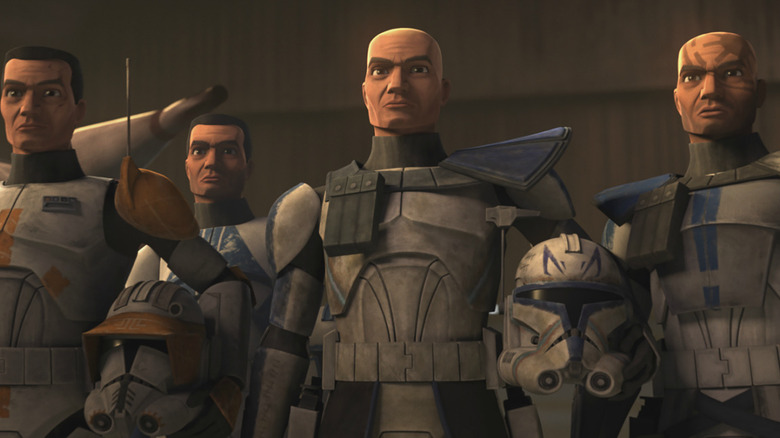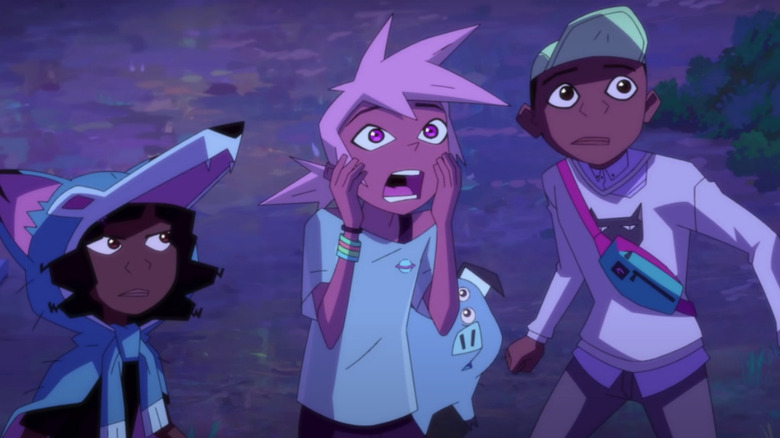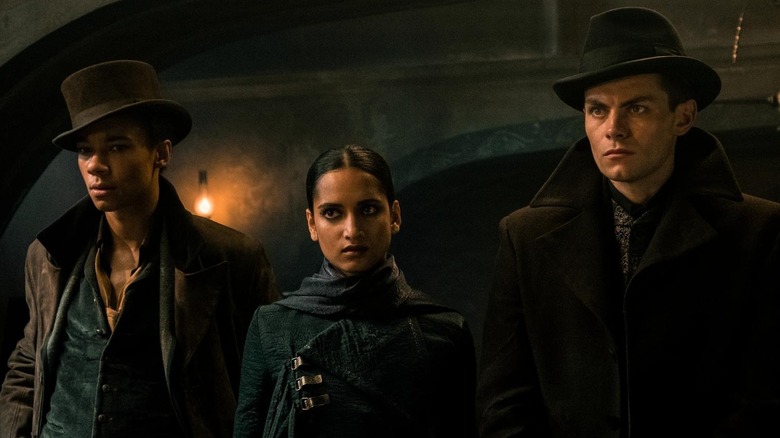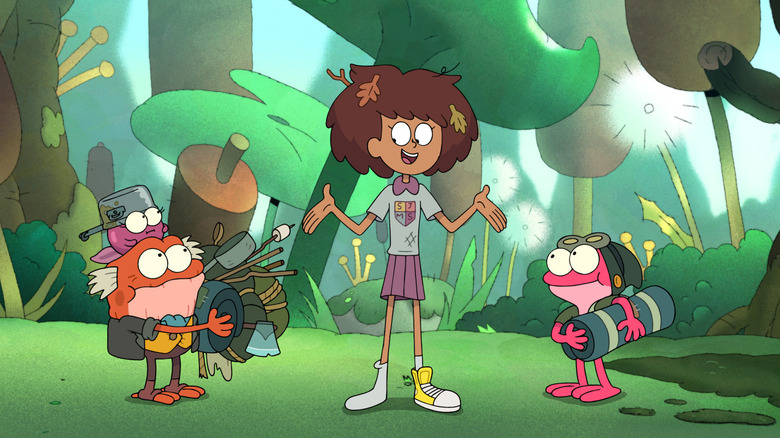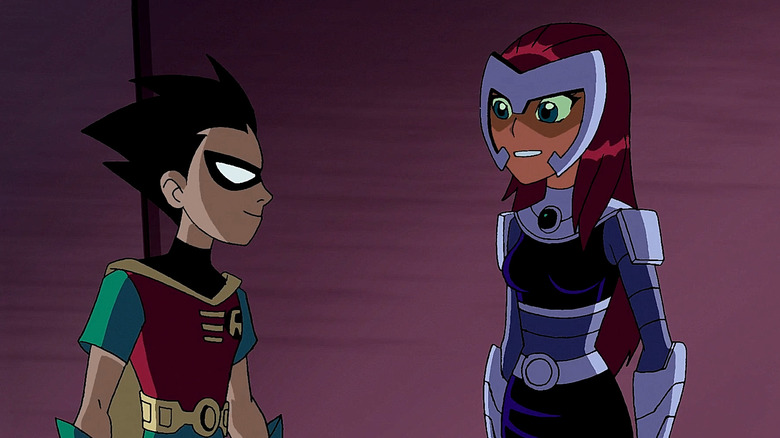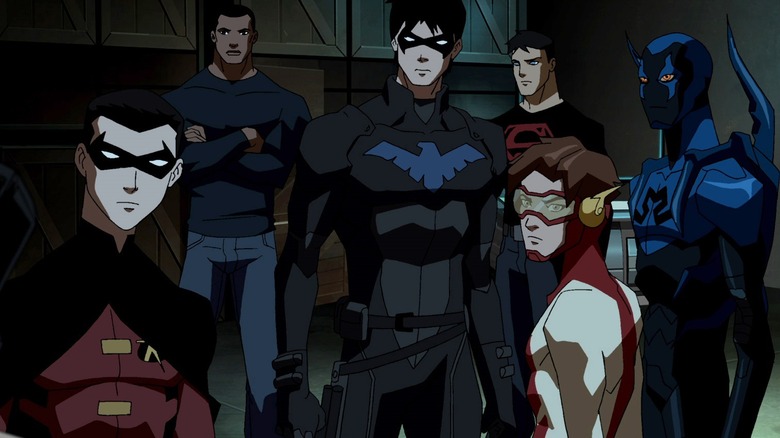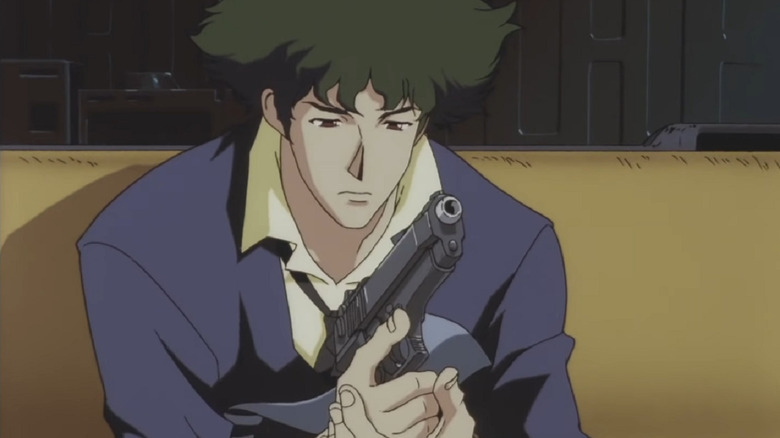20 Shows Like Avatar: The Last Airbender Fans Need To See Next
There has never been a show quite like "Avatar: The Last Airbender," and that's a testament to its enduring greatness. It's a masterfully crafted series that plays to every demographic, has a perfectly paced and beautifully written three-act story, is gorgeously animated, and features a truly exceptional voice cast. There are numerous reasons why the series has remained so popular for so long, and its legacy will likely only grow stronger with so many upcoming sequel and spinoff projects on the horizon, from both Netflix and Nickelodeon.
But just because nothing quite matches "Avatar" in every way doesn't mean there aren't still plenty of similar shows out there that its fans may also enjoy. Since "Avatar" has so many layers to it, it has a lot of different points of entry for viewers. Is it the gorgeous animation that draws you to the world of "Avatar"? The fantasy worldbuilding and elemental powers? The comedy? The spiritualism? The exciting fight scenes? Whatever it is for you, there are other shows out there that can scratch that same itch.
Below are some exceptional series like "Avatar: The Last Airbender" that fans should check out. Get ready — perhaps your next favorite series is simply a "play" button away.
The Legend of Korra
In a perfect world, everyone who loves "Avatar: The Last Airbender" and wants more has already seen "The Legend of Korra." It's a no-brainer, seeing as how "Korra" is a direct sequel with an equally stellar voice cast and most of the same creative team behind it that produced "Avatar."
Unfortunately, we don't live in a perfect world. We live in a world where still, somehow, there are diehard "Avatar" fans out there who haven't watched "The Legend of Korra" all the way through. If that label applies to you, please let this be the final push you need to drop what you're doing and go watch this incredible show.
To the naysayers out there, yes, "Korra" is a little bit messier than "Avatar." The first season was originally ordered by Nickelodeon as an independent miniseries, Season 2 was ordered by itself afterwards, and though Seasons 3 and 4 were ordered together, budget cuts and constant threats of cancellation forced the show's creators to make some tough compromises. But those caveats are nothing compared to what "The Legend of Korra" actually delivers. The pacing may be a bit less consistent than in "Avatar," but the animation from Studio Mir is even more impressive, the fight scenes are flashier and more complex, and the thematic content of the series ventures to heavier, darker, and more complex places. "Korra" is a show about trauma on both personal and societal levels. It's a show about forgiveness, growth, family, and failure.
It's a show that any fan of "Avatar: The Last Airbender" absolutely needs to see.
The Owl House
Now that the most obvious recommendation is out of the way, let's transition to something a bit different: Disney's acclaimed witch and demon saga, "The Owl House." First debuted on Disney Channel in January of 2020, "The Owl House" follows the animated adventures of Luz, a regular human girl who gets transported into the demon realm by mistake and ends up training to become a witch. The series is led by "Gravity Falls" alum Dana Terrace, and there are a lot of clear similarities between the two shows — and of course, there's also a lot to like about "The Owl House" if you're a fan of "Avatar: The Last Airbender."
The core story of the two shows is very similar: A young protagonist in a magical realm trains in the mystic arts, goes on adventures with her friends, and learns meaningful lessons about the world. The visual style of "The Owl House" may look like it's meant for a younger audience at first glance, but make no mistake, this is an expertly-written show that deals with serious themes and treats all of its characters with respect. People grow, change, learn, fail, and rise again, and their relationships with one another are deeply compelling. "The Owl House" is also aesthetically stunning, with gorgeous, fluid animation, lots of fun worldbuilding, and a great soundtrack to tie it all together. This is a show that embraces characters of all identities and backgrounds, and it's stronger for it.
Full Metal Alchemist: Brotherhood
Because "Avatar: The Last Airbender" draws so heavily from Japanese animation (such as the films of Hayao Miyazaki), the series is often compared to various anime. And out of all those comparisons, "Full Metal Alchemist" may be the show with most similarities to "Avatar."
There are few main reasons why. To start, the fantasy worlds in both shows are pretty comparable. Without being steampunk (though "Alchemist" could be called that at times), they both balance the aesthetic and societal structure of traditional fantasy with technology levels akin to the early 20th century (a bit more advanced in "FMA" than "Avatar"). In both worlds, supernatural abilities exist, but rather than being broadly characterized as magic, they fit into specific systems with complex rules — bending in "Avatar," alchemy in "Full Metal Alchemist." Like "Avatar," "FMA" is also largely a traveling show. Most episodes consist of Ed and Al, the two brothers at the center of the story, journeying to a new town, meeting some new side characters, and solving some sort of one-off conflict or mystery, all while more long-term plotlines slowly develop in the background.
The biggest question with "FMA" is which version is best to watch, the original 2003 series, or "Full Metal Alchemist Brotherhood," which premiered in 2009? Both shows have their supporters, but the general consensus is to go with "Brotherhood" because of its superior animation and greater loyalty to the original manga (the voice cast is mostly the same). "Brotherhood" holds an impressive 9.1/10 rating on IMDB, compared to an 8.5/10 for the original "Full Metal Alchemist."
Adventure Time
When talking about the most influential animated series of the 21st century, "Avatar" and "Adventure Time" are both right near the top. Pendleton Ward's trippy fantasy show gives the initial impression that it's just a silly cartoon with some fun visuals, but there's a lot more to "Adventure Time."
Yes, it can be pretty silly, and that's kind of the point. The intention is right here in the name — adventure. Jake the Dog and Finn the Human go on absurd journeys where they deal with sentient candy, aliens, demons, monsters, wizards, vampires, and time travel, just to name some of the show's storylines. But amidst all that silliness — which, it should be noted, is all written sharply and hilariously with all ages in mind — there are also moments of genuine heart. Ward has cited Miyazaki as a major influence on the show, especially in how it handles the more poignant moments of the story. And that influence shows, just as it does in "Avatar."
Because of its success and impact, there are now a lot of great shows like "Adventure Time." At the same time, there's still nothing quite like "Adventure Time" itself. The worldbuilding and larger arcs aren't conducted in a traditional way, but one that results in a unique sense of discovery for the viewer. If you haven't yet, grab your friends, and take "Adventure Time" for a spin.
Arcane
Based on the wildly popular video game "League of Legends," Netflix's "Arcane" has a lot in common with "Avatar: The Last Airbender" and "The Legend of Korra." The show takes place in a pretty standard steampunk world — airships, oppressive regimes, hard societal divisions, guns, magic, etc. — but its strict adherence to the genre is far from a bad thing. Rather, "Arcane" uses familiar conventions to build a strong foundation, on which it positions an ensemble of compelling, deeply flawed characters. The animation style is beautiful and distinct, and there's a lot to dive into when it comes to the series' lore, characters, and world.
Make no mistake, though: "Arcane" has a distinctly different tone than "Avatar" does. The structure and writing are in line with other fantasy series aimed at kids and young adults, but the content conveyed here skews much darker. This is a show where good people cause terrible tragedies by mistake and are forced to live with the consequences. A ton of people die, and most characters live in a world filled with danger and trauma. For these reasons, "Arcane" may best be enjoyed by older viewers who still have an affinity for the distinct narrative style of YA fantasy.
And no, don't worry, you don't need to know anything about "League of Legends" to enjoy the show.
Voltron: Legendary Defender
A lot of amazingly talented creatives left their marks on "Avatar: The Last Airbender," and in the decade and a half since the show ended, many of those writers, directors, and artists have moved on to other animated projects. Netflix's "Voltron: Legendary Defender" is one such show.
Helmed by Joaquim Dos Santos and Lauren Montgomery (two acclaimed directors and storyboard artists who worked heavily on "Avatar" and "The Legend of Korra"), "Voltron" reboots a classic franchise for modern viewers. The animation from Studio Mir is stunning, and the story, characters, and action are all top notch, earning the show an impressive 95% average rating on Rotten Tomatoes across all seasons. However, "Voltron" also hasn't gone without some warranted criticism, specifically in relation to its handling of LGBTQ+ characters.
All told, though, "Voltron" is still worth the watch, especially for "Avatar" fans with a strong affinity for science fiction and fantasy.
She-Ra and the Princesses of Power
Speaking of great animated series on Netflix, "She-Ra and the Princesses of Power" is another pick for fans of "Avatar: The Last Airbender." Based on the original "He-Man and the Masters of the Universe" spinoff, the Netflix reboot follows the heroic She-Ra and her various allies on their mission to protect the planet Etheria from the evil Horde. The story itself is par for the course when it comes to the genre, but there's a lot of exceptional depth and nuance in how the series handles its conflicts, characters, and their relationships. And of course, like most of the shows on this list, the animation looks great from start to finish.
Many of the big themes of "Avatar" are addressed in "She-Ra" as well, including redemption, sacrifice, and finding your true self. If you love "Avatar" because of the show's many empowered female characters (who doesn't?), "She-Ra" delivers plenty more.
And while you happen to be on Netflix already, you might also want to check out "Masters of the Universe: Revelation." It isn't canonically tied to "She-Ra," but it is an exciting fantasy adventure in its own right, filled with big-name voice actors and beautiful animation. It turns out that despite the controversies, it's a great time to be a "Masters of the Universe" fan.
Samurai Jack
When you think of animated series powered by beautifully animated martial arts action, "Avatar" immediately comes to mind, but so should "Samurai Jack." Originally aired from 2001 to 2004 and finally concluded in 2017, Genndy Tartakovsky's show about a time-traveling samurai battling evil in a dystopian future is an easy recommendation for anyone who has enjoyed Aang's adventures.
Over the course of its initial four seasons, "Samurai Jack" won numerous accolades, including multiple Annie Awards and Primetime Emmys. The 2017 revival season was also highly acclaimed upon release, and it takes the series in a darker direction both narratively and thematically. This is a show that rewards viewers for seeing it through by providing real emotional buildup and payoff. And beyond that, the show is just a ton of fun to watch. Tartakovsky is widely viewed as one of the best creators in modern animation, and it's easy to see why when watching "Samurai Jack."
Castlevania
If you love the stunning animation and exciting action of "Avatar" but are looking for something a little more adult-oriented, "Castlevania" is a great choice. Based on the Konami video game franchise of the same name, the show follows demon hunter Trevor Belmont, mage Sypha Belnades, and Alucard (the son of Dracula) on a journey to save the world from the forces of evil.
There's a lot to praise in "Castlevania," from the incredible musical score by Trevor Morris to the stellar voice cast led by Richard Armitage, Alejandra Reynoso, James Callis, and Graham McTavish. This is an action show first and foremost, and the fight scenes are some of the best in modern animation. Instead of employing the traditional fantasy tone of something like "Avatar," however, "Castlevania" pulls heavily from gothic literature and the horror genre.
The big warning here is that "Castlevania" is an incredibly violent, gory, and at times straight-up unsettling show. It's the kind of series that shows things you wouldn't see in live action because it would simply be too graphic. A lot of the central characters are mass murderers, but within the gothic style the show uses, they work. The writing and character development is excellent, and the series has a wonderful sense of momentum, knowing just when to slow down for a while and when to ramp back up for some climactic action. If you enjoy seeing characters talk as much as you enjoy seeing them fight, "Castlevania" is for you.
Invincible
While we're on the subject of violent and bloody animated series, we should probably talk about Amazon's "Invincible," based on "The Walking Dead" creator Robert Kirkman's comic books of the same name.
"Invincible" isn't fantasy, and it's far darker than "Avatar," but the two shows still share a lot in common. They're both coming-of-age stories featuring young protagonists who genuinely want to do good in the world. They're both at the top of the game in terms of animation, action, characters, and voice acting. It would take a whole paragraph to name every star in the "Invincible" voice cast, but suffice it to say that the ensemble as a whole is terrific, and that Steven Yeun, J. K. Simmons, and Sandra Oh lead the show spectacularly as the voices behind the Grayson family.
Like "Castlevania," "Invincible" is gratuitously violent, so know that going in. But if you can stomach the bloodier bits, it's a great watch. "Invincible" balances the darker superhero narrative of something like "The Boys" with the more traditional optimism of light comic book stories, and the result is one of the best animated series in recent years.
The Dragon Prince
With the exception of "Korra," "The Dragon Prince" is probably the show most similar to "Avatar: The Last Airbender" on this entire list. It's a show that tries incredibly hard — arguably too hard — to be "Avatar." That may largely be because the main man behind it, Aaron Ehasz, worked as an executive producer and head writer on "Avatar." The reputation of "The Dragon Prince" has been somewhat tainted by allegations of toxic behavior made against Ehasz by former employees, but the series has continued to earn critical praise, prompting Netflix to order a total of seven seasons, three of which have been released as of this writing.
Some of this may sound familiar to you.
There's a fantastical world divided into different nations and kingdoms, some of which have a history of war with each other. The magic system in this world is based on different elemental abilities, which are commonly associated with different parts of the world and the people who live there. The seasons, called books, are labeled according to the element most primarily associated with their respective storylines. Jack DeSena, the voice of Sokka, even stars as the main character Callum.
For all the ways in which "The Dragon Prince" tries to emulate "Avatar," it is unequivocally a very different show. The jokes and storylines are more targeted at younger viewers than the multigenerational writing of "Avatar," but there's still a lot that fans of the genre may enjoy here.
Teenage Mutant Ninja Turtles
To date, there have been four different "Teenage Mutant Ninja Turtles" cartoons, starting with the original 1987 classic and continued most recently with Nickelodeon's "Teenage Mutant Ninja Turtles" (2012-2017) and "Rise of the Teenage Mutant Ninja Turtles (2018-2020)". Each iteration has its supporters, and for good reason, but today we're focusing specifically on the second "TMNT" cartoon, produced by 4Kids Entertainment from 2003 to 2009.
Why this series in particular? There are a few reasons. To start, the 4Kids "TMNT" show ran at the same time as "Avatar," and as a result it has many similarities in terms of writing, tone, and animation style. They're far from the same, and "Avatar" is obviously one of a kind, but there's an undeniable style to cartoons of the early 2000s that fans of the era will immediately recognize in both shows. Secondly, the 2003 "Teenage Mutant Ninja Turtles" series is the most serious. There are still plenty of comedy episodes, dumb jokes, pizza parties, and inexplicable extreme sports references, but there are also a lot of big-picture storylines and character arcs. Actions have real consequences, power balances shift, and by the time the last few seasons roll around, the stakes are pushed to wildly entertaining heights.
The animation and larger themes of "TMNT" also deserve praise, but the real appeal is that it takes itself just seriously enough, while still holding onto the silly fun implicit in the franchise. That balance makes it a must-watch for fans of this cartoon era.
Steven Universe
Jumping back into the realm of more modern cartoons, Cartoon Network's "Steven Universe" has a lot that "Avatar: The Last Airbender" fans should love. The series follows the adventures of the titular Steven, the son of a human and a powerful alien called a Crystal Gem. With the help of three other Gems who he lives with — Garnet, Amethyst, and Pearl — Steven learns how to use his own unique powers and fights against malicious forces to protect his home and friends.
There's plenty of worldbuilding and lore to dive into in "Steven Universe," and the big plot arcs span multiple seasons. But to describe the show only in terms of its literal plot is to do it a major disservice. The real draw here is how much genuine heart there is in every single episode of "Steven Universe." Characters deal with complex issues like trauma, insecurity, imposter syndrome, anxiety, and personal identity, but these themes are all handled masterfully with a blend of optimism and sharp humor.
"Steven Universe" has also been heavily praised for its discussion of LGBTQ+ identity and experience, with lots of characters embodying experiences of transness, nonbinary identity, and gender fluidity in particular. Everything is handled with a deft and compassionate touch, leading to character arcs that feel genuinely affecting, no matter what age you are.
Star Wars: The Clone Wars
This is not a list for "Star Wars" fans. This is a list for "Avatar" fans. As such, we're not going to talk about "The Clone Wars" as a part of the greater "Star Wars" lore, but rather as a singular animated series that viewers might come to with or without knowledge of the movies surrounding it.
And as an isolated animated series, "The Clone Wars" is still spectacular.
Yes, most people who'd ever watch the show at this point have probably seen at least one "Star Wars" movie, but you don't need that familiarity to enjoy the spectacular animation, character work, action, and storytelling that define "The Clone Wars." Most of the best and most important characters in the series are either entirely new to the franchise (Ahsoka Tano, Asajj Ventress, Cad Bane, Captain Rex, Savage Opress, Satine Kryze), barely appear in the films (Darth Maul, Plo Koon, numerous other Jedi), or are very different than they're portrayed elsewhere (Anakin). The only central character who remains unchanged is Obi-Wan.
In fact, "Clone Wars" might be one of the best ways for modern audiences to get into "Star Wars" for the first time. There are tons of different story arcs that differ wildly in tone and focus, meaning that everyone can find something here to love. Like "Avatar," "The Clone Wars" treats its characters and circumstances with respect and allows them to grow in organic ways. By the time you get to the last few seasons, the emotional stakes are high, and the whole series is just visually stunning to watch.
While you're at it, the Genndy Tartakovsky "Clone Wars" series is worth checking out too.
Kipo and the Age of Wonderbeasts
Netflix's "Kipo and the Age of Wonderbeasts" has all the trappings of an "Avatar"-style fantasy adventure, but it's also refreshingly original in a lot of ways. The show takes place in a post-apocalyptic version of Earth where giant, mutated animals have become the dominant race and humans have been forced to live underground. It's an eclectic world that mixes elements of fantasy, sci-fi, and dystopia with tonal flairs of cyber-techno and hip-hop, among other things. It's a strikingly fresh aesthetic that gives the whole series a fun glow.
There's a lot else to love about "Kipo" aside from its original worldbuilding. Like "Avatar," it's a travel-based show with a compelling group of core characters who grow and change over time. The animation from Studio Mir is beautiful and quirky, the soundtrack is a refreshing mix of different styles and genres, and the series boasts a truly diverse cast of characters. At just three seasons of 10 episodes each, it's a quick and easy watch that's over way too soon, but it also avoids the danger of feeling rushed along the way. "Kipo and the Age of Wonderbeasts" holds a perfect score across all three seasons on Rotten Tomatoes, and it's easy to see why.
Shadow and Bone
There can be a big difference in tone and feel between an animated series and a live-action series, even if they both cover similar subject matter. For that reason, most of the shows included on this list are animated — but "Shadow and Bone" is the one exception. For anyone who loves the worldbuilding of "Avatar" but isn't attached to animation as their form of choice, this Netflix series is for you.
Based on Leigh Bardugo's bestselling Grishaverse novels, "Shadow and Bone" is set in a fantasy world inspired by 19th century Russia. Certain humans in the world, called Grisha, are able to manipulate the different elements in magical ways. These Grisha are categorized by the element they work with — air, water, fire, darkness, light, etc. — and the way in which they can manipulate that element. While not a play-for-play mirror of bending, the way the Small Science (as it's called in the series) is used and the role it plays in the world at large is rather similar.
Of course, the real reason to watch "Shadow and Bone" is just that it's exceptionally well made. Jessie Mei Li, Freddy Carter, Kit Young, Amita Suman, Ben Barnes, and the rest of the cast have great chemistry, and the production design of Netflix's adaptation is striking and unique. Plotlines are expertly interwoven, creating a world that's easy to get lost in for all the right reasons.
Amphibia
Disney's "Amphibia" gets clumped together with "The Owl House" a lot, and for good reason. The two shows started airing on Disney Channel within six months of each other, they were both created by artists who worked on "Gravity Falls," and both star teenage girls being magically teleported to fantasy worlds where they have to find a way home.
They're also both really, really good.
Instead of a cartoon demon realm, though, "Amphibia" takes place in a magical world filled with, well, frogs. And other amphibians, as the name suggests. It's an incredibly specific and unorthodox setting, even for a cartoon, but the show pumps so much depth and variety out of its world that it feels like a stroke of genius. This is a show where details matter — where continuity is watched closely, and all the different plotlines and character arcs weave together and connect in myriad ways.
And of course, because of the young target demographic of Disney Channel, "Amphibia" never gets too dark. It's fun, funny, and brilliantly creative, with a fantastic voice cast to anchor the entire thing. Don't let the name fool you — this show is about far more than just frogs.
Teen Titans
"Avatar: The Last Airbender" and "Teen Titans" are often mentioned in tandem, especially by those who grew up on early 2000s cartoons. Though they aired on two different networks, they did overlap in 2005 and 2006, and there are definitely a lot of similarities between the two shows. Most importantly, they share a high quality of story and character writing that put them head and shoulders above most of the competition at the time.
In the modern era of superhero media dominance, most people are probably already familiar with the general setup for "Teen Titans." The show centers on the eponymous team of teen heroes, composed of Robin, Cyborg, Starfire, Raven, and Beast Boy. Each season tells a largely self-contained story with one of the main heroes at the center, gradually fleshing out the whole team over the course of a few years.
"Teen Titans" may not be quite as impressive now as it was back in 2003, but it's still a great example of how to do action adventure cartoons right. The characters are nuanced and developed, but the narrative focus never gets too big-picture. Especially if you have nostalgia for this era of animation, "Teen Titans" is well worth revisiting.
Young Justice
While on the subject of DC Comics, "Young Justice" is another great watch that feels in many ways like the natural evolution of "Teen Titans." The main group of heroes here is a bit different, consisting of Robin (who later takes on the persona of Nightwing), Kid Flash, Miss Martian, Superboy, Aqualad, and Tigress. "Young Justice" originally aired for only two seasons on Cartoon Network from 2010 to 2013, but it was revived in 2019 and has continued to earn high acclaim, currently ranked at 95% on Rotten Tomatoes.
The pitch here is very similar to "Teen Titans," but that's not to say that "Young Justice" is the same show play for play. The writing is more mature, the themes are a bit heavier, and characters become a bit more complex. Still, the dedication to fun and exciting comic book storylines remains, both across individual episodes and season-long arcs. With a star-studded voice cast that includes the likes of Nolan North, Khary Payton, Jason Spisak, Mae Whitman, Kevin Michael Richardson, and Troy Baker, there's a lot to dive into and love in "Young Justice."
Cowboy Bebop
Finishing off our list is one of the main shows that inspired "Avatar: The Last Airbender," the acclaimed sci-fi anime series "Cowboy Bebop." The show is just as fantastic almost 25 years after its original run, and while much has been made of the recent live-action remake on Netflix, nothing compares to the original.
At face value, "Cowboy Bebop" is a show about bounty hunters in space. They travel around, get into trouble, and try to capture bad guys to keep food on the table and fuel in their ship, the Bebop. But that's not really why you watch the series. The medium is definitely the message here, from the gritty, industrial look of the various planets and space stations to the incredible jazz soundtrack from composer Yoko Kanno. "Cowboy Bebop" is a melancholy show about loss and regret, but it also has a great sense of humor and some really stylish action scenes. It's neo-noir, space opera, and western all rolled into one, resulting in a show that's truly one of a kind.
There's plenty of character backstory to uncover and long-term plot arcs to get invested in, but that's not really the point. "Cowboy Bebop" is a show that's more about the atmosphere than the plot — more about the journey than the destination. It's short, bittersweet, and beautifully executed, and if you haven't watched it yet, now is the time.
